We offer a wide variety of courses and are receiving increasing recognition for our leadership in the use of innovative teaching methods in studio courses, research on emerging landscape design issues, and community-building services.
Our courses integrate the development of core design skills with our research, teaching and service focus on urban ecological design. Highlights include:
- Culturally-based place making, through design build studio, cultural landscape, and community design studios
- Ecological infrastructure through natural processes, ecological planning and design, and landscape technology studios
- Design for ecological literacy in all coursework
- Participatory design in advanced landscape architecture and interdisciplinary studios
The University of Washington Course Catalog provides a general description for our courses. See below for recent and current course lists. Contact landarchinfo@uw.edu for course syllabi.
2024 – 2025 Course Lists
UWLA Autumn 2025 Course Offerings
UWLA Spring 2025 Course Offerings
UWLA Winter 2024 Course Offerings
Autumn 2025 MLA Selective Course Offerings
Autumn 2025 BLA Directed Electives
Summer 2025 BLA Directed Electives
Summer + Autumn 2025 Courses Open to Non Majors + Special Topics
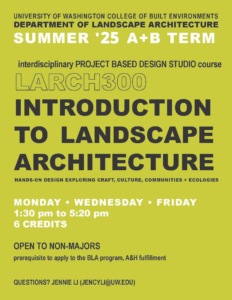 L Arch 300: Introduction to
L Arch 300: Introduction to
Landscape Architecture
Shaunta Butler
6 credits A&H, fulfills BLA prerequisite
MWF 1:30-5:20, Summer full term (A + B)
SLN: 11772
LARCH300 is an overview of the broad spectrum of the landscape architecture profession. Students will be introduced to the creative design process via contemporary methods, applications, and practices of landscape design. They will develop the basic skills and fundamental concepts of landscape architectural design and explore site design through projects that require them to draw, research, build, analyze, collaborate, and present ideas that encompass various facets of the field.
Alicia Daniels Uhlig
5 credits, Counts towards NSc requirements
MW 2:30-4:20PM
SLN: 17109 or 17110 for FID Students
The health of our world and the quality of our lives and future generations depends on how we act now and plan for our future built environment. This foundational course will use the United Nation’s Sustainable Development Goals (SDGs) to examine the social, environmental, and economic concerns that all nations must confront in the face of issues such as climate change, poor health & wellbeing, and unsustainable growth & consumption. We’ll examine case studies of strategies in design, planning, and policy to engage these issues through just and equitable practices in the built environment
Open to all students
Elizabeth Umbanhowar
5 Credits A&H/SSc+Writing, counts towards BLA major
TTh 11:30–2:20
SLN: 16357
Landscape architecture is more than the study of elite, private gardens. Landscape histories bear witness to the diverse experiences, ideas, and people that, through time, have shaped places both exalted and everyday. In this survey, we critically examine the writing, production, and performance of global landscapes and their narratives from the Paleolithic to the mid-19th century in this critical survey. Through diverse archives, landscapes, and media, we will learn to “read” cultural and designed landscapes and their histories offers important life skills: to challenge the legacies of colonialism and oppression, interrogate our present-day environmental crises, and apply our learning to navigate uncertain futures.
Open to all students
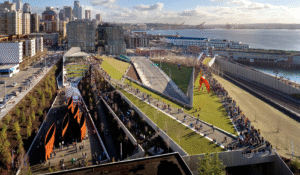 Daniel Winterbottom
Daniel Winterbottom
3 credits, Counts towards A&H requirements
TTh 11:30 AM – 12:50PM
SLN: 17113
“Site design and planning is the art and science shaping the places we live and work. Its aim is foundationally moral and aesthetic: to enhance everyday life.” – Lynch and Hack, Site Planning
Through field trips, lectures, drawing, and discussion, this course explores the art and science of shaping sites. Balancing broad conceptual frameworks with practical tools, we will survey the ecological, cultural, political and technical dimensions that influence site design and planning in contemporary practice.
Open to all students
Past Terms
Spring 2025 Courses Open to Non Majors + Special Topics
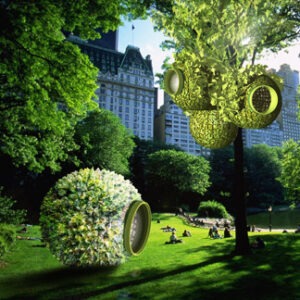
Keith Harris
5 credits, Counts towards SSc/A&H requirements
MWF 1:00-2:20PM
SLN: 15900
How do landscape architects and other designers shape our cities, our lives, and our futures? Through fieldwork, hands-on activities, research, and discussion, this course explores innovative and interdisciplinary design thinking and practice that addresses critical human issues from the local to the global scale.
Open to all students
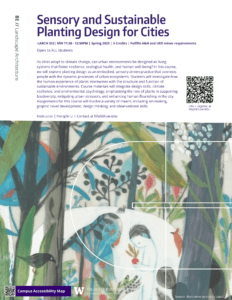 Hongfei Li
Hongfei Li
3 credits, Counts towards A&H & UED minor requirements
MW 11:30 – 12:50PM
SLN: 15092
As cities adapt to climate change, can urban environments be designed as living systems that foster resilience, ecological health, and human well-being? In this course, we will explore planting design as an embodied, sensory-driven practice that connects people with the dynamic processes of urban ecosystems. Students will investigate how the human experience of plants intertwines with the structure and function of sustainable environments. Course materials will integrate design skills, climate resilience, and environmental psychology, emphasizing the role of plants in supporting biodiversity, mitigating urban stressors, and enhancing human flourishing in the city. Assignments for this course will involve a variety of means, including art-making, graphic novel development, design thinking, and observational skills.
Open to all students
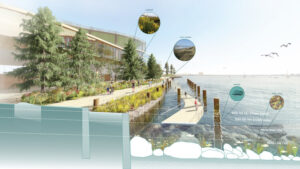 Celina Balderas Guźman
Celina Balderas Guźman
3 credits, BLA requirement, Counts towards NSc requirements
TTh 10:00 – 11:20AM
SLN: 15903
This lecture course offers an introduction into the complex field of ecological design and planning which integrates ecological research and knowledge into design and planning projects and applications. The educational experiences supports all students interested in applied approaches for improving the sustainable and resilience of urban and rural places with an emphasis on systems thinking, ecological rehabilitation and restoration, and creative problem-solving.
Open to all students
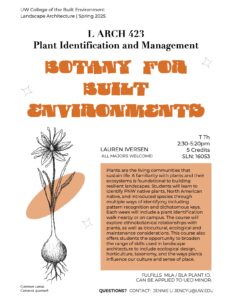 Lauren Iversen
Lauren Iversen
3 Credits, Counts towards MLA / BLA Plant ID. Can be applied to UED Minor.
TTh 2:30 – 5:20PM
SLN: 15906
Plants are the living communities that sustain life. A familiarity with plants and their ecosystems is foundational to building resilient landscapes. Students will learn to identify PNW native plants, North American native, and introduced species through multiple ways of identifying including pattern recognition and dichotomous keys. Each week will include a plant identification walk nearby or on campus. The course will explore ethnobotanical relationships with plants, as well as biocultural, ecological and maintenance considerations. This course also offers students the opportunity to broaden the range of skills used in landscape architecture to include ecological design, horticulture, taxonomy, and the ways plants influence our culture and sense of place.
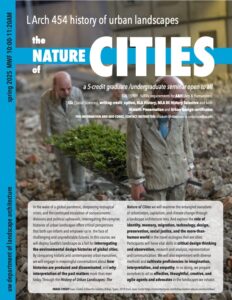 Elizabeth Umbanhowar
Elizabeth Umbanhowar
5 Credits, A&H/SSc+Writing, counts towards BLA major, MLA BE History Selective, Historic Preservation and Urban Design Certificates
MWF 10:00 – 11:20 AM
SLN: 15909
In the wake of a global pandemic, deepening ecological crises, and the continued escalation of socioeconomic divisions and political upheavals, interrogating the complex histories of urban landscapes offers critical perspectives that both can inform and empower us in the face of challenging and unpredictable futures. In this course, we will deploy Seattle’s landscape as a foil for interrogating the environmental design histories of global cities. By comparing historic and contemporary urban narratives, we will engage in meaningful conversations about how histories are produced and disseminated, and why interpretation of the past matters more than ever today. Through the History of Urban Landscapes: The Nature of Cities we will examine the entangled narratives of colonization, capitalism, and climate change through a landscape architecture lens. And explore the role of identity, memory, migration, technology, design, preservation, social justice, and the more-than-human world in the novel ecologies that are cities. Participants will hone vital skills in critical design thinking and observation, research and analysis, representation and communication. We will also experiment with diverse methods and cultivate proficiencies in imagination, interpretation, and empathy. In so doing, we prepare ourselves to act as effective, thoughtful, creative, and agile agents and advocates in the landscapes we inhabit.
1 Credit Workshop (By Application)
See Drawing in Design page for more information
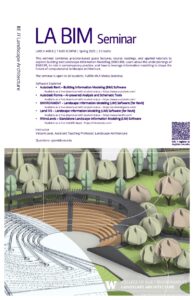 Vincent Javet
Vincent Javet
3 credits, Counts towards MLA Media Selective
T 6:00 – 8:50PM
This seminar combines practice-based guest lectures, course readings, and applied tutorials to explore Building and Landscape information Modeling (BIM/LIM). Learn about the underpinnings of BIM/LIM, its role in contemporary practice, and how to leverage information modeling to shape the future of computational landscape architecture.
This Seminar is open to all students.
Software explored includes:
- Autodesk Revit – Building information Modeling (BIM) Software:Available as a free download with student status – https://www.autodesk.com/
- Autodesk Forma – AI-Powered Analysis and Schematic Tool: Available as a free download with student status – https://www.autodesk.com/
- ENVIRONMENT – Landscape Information Modeling (LIM) Software [for Revit] Available as a free download with student status – https://arcintelligence.com/
- Land F/X – Landscape Information Model (LIM) Software [for Revit] Available as a free download with student status – https://www.landfx.com/
- RhinoLands – Standalone Landscape Information Modeling (LIM) Software Available as a free download with student status – https://www.rhinolands.com/
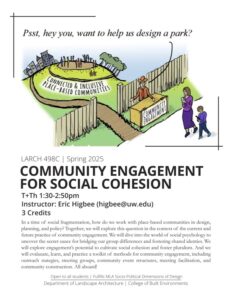 Eric Higbee
Eric Higbee
3 Credits, Counts towards MLA Socio-political Dimensions of Design Selective
TTh 1:30 – 2:50PM
In a time of social fragmentation, how do we work with place-based communities in design, planning, and policy? Together, we will explore this question in the context of the current and future practice of community engagement. We will dive into the world of social psychology to uncover the secret sauce for bridging our group differences and fostering shared identities. We will explore engagement’s potential to cultivate social cohesion and foster pluralism. And we will evaluate, learn, and practice a toolkit of methods for community engagement, including outreach strategies, steering groups, community event structures, meeting facilitation, and community construction. All Aboard!
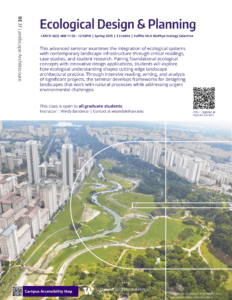 Windy Bandekar
Windy Bandekar
3 credits, Counts towards MLA BioPhys Ecology Selective
MW 11:30 – 12:50PM
Open to all graduate students.
This advanced seminar examines the integration of ecological systems with contemporary landscape infrastructure through critical readings, case studies, and student research. Pairing foundational ecological concepts with innovative design applications, students will explore how ecological understanding shapes cutting-edge landscape architectural practice. Through intensive reading, writing, and analysis of significant projects, the seminar develops frameworks for designing landscapes that work with natural processes while addressing urgent environmental challenges.
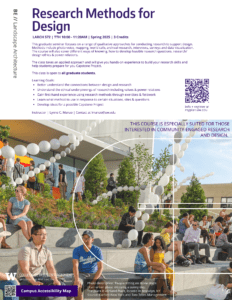 Lynne C. Manzo
Lynne C. Manzo
3 Credits
TTh 10:00 – 11:20AM
This class is open to all graduate students.
This graduate seminar focuses on a range of qualitative approaches for conducting research to support design. Methods include photo-voice, mapping, world cafe, archival research, interviews, surveys and data visualization. The course will also cover different ways of knowing, how to develop feasible research questions, research/ design ethics & power relations. This class takes an applied approach and will give you hands-on experience to build your research skills and help students prepare for you Capstone Project.
Learning Goals:
- Better understand the connections between design and research
- Understand the ethical underpinnings of research including values & power relations
- Gain first-hand experience using research methods through exercises & fieldwork
- Learn what method to use in response to certain situations, site & questions
- Develop ideas for a possible Capstone Project
Winter 2025 Courses Open to Non Majors + Special Topics
L Arch 300 Introduction to Landscape Architecture Studio
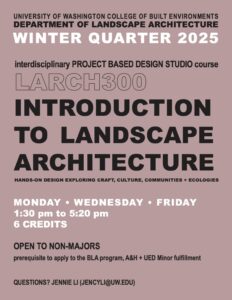 Shaunta Butler
Shaunta Butler
6 credits A&H, BLA prerequisite
MWF 1:30-5:20
SLN: 16356
LARCH300 is an overview of the broad spectrum of the landscape architecture profession. Students will be introduced to the creative design process via contemporary methods, applications, and practices of landscape design. They will develop the basic skills and fundamental concepts of landscape architectural design and explore site design through projects that require them to draw, research, build, analyze, collaborate, and present ideas that encompass various facets of the field. Students will have a portfolio by the end of the course, and be prepared to apply for the BLA program if desired.
L Arch 361 Human Experience of Place
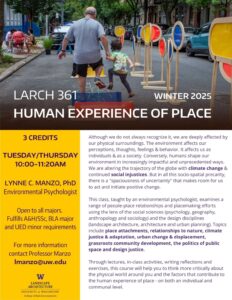 Lynne Manzo
Lynne Manzo
3 credits A&H/SSc+Div, counts towards BLA major
TTh 10:00-11:20
SLN: 16359
Although we do not always recognize it, we are deeply affected by our physical surroundings. The environment affects our perceptions, thoughts, feelings & behavior. It affects us as individuals & as a society. Conversely, humans shape our environment in increasingly impactful and unprecedented ways. We are altering the trajectory of the globe with climate change & continued social injustices. But in all this socio-spatial precarity, there is a “spaciousness of uncertainty” that makes room for us to act and initiate positive change.
This class, taught by an environmental psychologist, examines a range of people-place relationships and placemaking efforts using the lens of the social sciences (psychology, geography, anthropology and sociology) and the design disciplines (landscape architecture, architecture and urban planning). Topics include place attachments, relationships to nature, climate justice & adaptation, urban change & displacement, grassroots community development, the politics of public space and design justice.
Through lectures, in-class activities, writing reflections and exercises, this course will help you to think more critically about the physical world around you and the factors that contribute to the human experience of place – on both an individual and communal level.
L Arch 353 Modern Landscape History
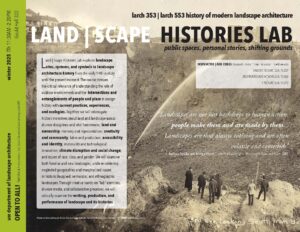 Elizabeth Umbanhowar
Elizabeth Umbanhowar
5 Credits A&H/SSc+Writing, counts towards BLA major
TTh 11:30–2:20
SLN: 16357
This course explores landscape sites, systems, and symbols from the early 19th century until the present moment, stressing the intersections and entanglements of people and place in history with current politics, experiences, and ecologies. Through creative “lab” exercises, diverse media, and collaborative processes, we will critically examine the writing, production, and performance of landscape and its histories thematically through the diverse lenses of: power and ownership; memory and representation; knowledge and experience; labor and production; materiality and technological innovation; climate disruption and social change; identity and emotion; and race, class, and gender.
L Arch 498C Perceptions of Nature in the Dense City
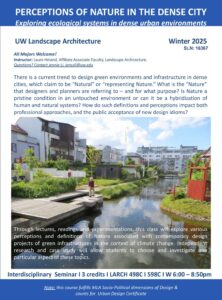 Laure Heland
Laure Heland
3 Credits
W 6:00-8:50 PM, counts towards MLA Socio-political Dimensions of Design Selective
SLN: 16367
There is a current trend to design green environments and infrastructure in dense cities, which claim to be “Natural” or “representing Nature.” What is the “Nature” that designers and planners are referring to – and for what purpose? Is Nature a pristine condition in an untouched environment or can it be a hybridization of human and natural systems? How do such definitions and perceptions impact both professional approaches, and the public acceptance of new design idioms?
L Arch 561 Human Experience of Place
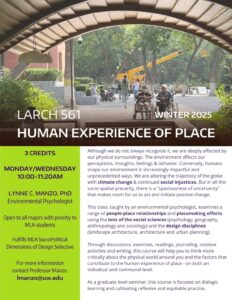 Lynne Manzo
Lynne Manzo
3 Credits, counts towards MLA Socio-political Dimensions of Design Selective
MW 10:00-11:20
SLN: 16373
Although we do not always recognize it, we are deeply affected by our physical surroundings. The environment affects our perceptions, thoughts, feelings & behavior. It affects us as individuals & as a society. Conversely, humans shape our environment in increasingly impactful and unprecedented ways. We are altering the trajectory of the globe with climate change & continued social injustices. But in all this socio-spatial precarity, there is a “spaciousness of uncertainty” that makes room for us to act and initiate positive change.
This class, taught by an environmental psychologist, examines a range of people-place relationships and placemaking efforts using the lens of the social sciences (psychology, geography, anthropology and sociology) and the design disciplines (landscape architecture, architecture and urban planning). Topics include place attachments, relationships to nature, climate justice & adaptation, urban change & displacement, grassroots community development, the politics of public space and design justice.
Through discussions, exercises, readings, journaling, creative activities and writing, this course will help you to think more critically about the physical world around you and the factors that contribute to the human experience of place – on both an individual and communal level.
As a graduate level seminar, this course is focused on dialogic learning and cultivating reflexive and equitable practice.
As a graduate level seminar, this course is focused on dialogic learning and cultivating reflexive and equitable practice.
Autumn 2024 Courses Open to Non Majors + Special Topics
L Arch 210 Environmental Design and Sustainability
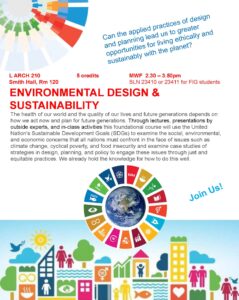 Ken Yocom
Ken Yocom
5 credits NSc
MWF 2:30-3:50
SLN: 23410
The health of our world and the quality of our lives and future generations depends on how we act now and plan for future generations. This foundational course will use the United Nation’s Sustainable Development Goals (SDGs) to examine the social, environmental, and economic concerns that all nations must confront in the face of issues such as climate change, cyclical poverty, and food insecurity and examine case studies of strategies in design, planning, and policy to engage these issues through just and equitable practices.
L Arch 341 Site Design and Planning

Catherine DeAlmeida
3 credits, A&H
TTh 11:30-12:50
SLN: 17230
“Site design and planning is the art and science shaping the places we live and work. Its aim is foundationally moral and aesthetic: to enhance everyday life.” – Lynch and Hack, Site Planning
Through field trips, lectures, drawing, and discussion, this course explores the art and science of shaping sites. Balancing broad conceptual frameworks with practical tools, we will survey the ecological, cultural, political and technical dimensions that influence site design and planning in contemporary practice.
L Arch 352 History of Landscape Architecture
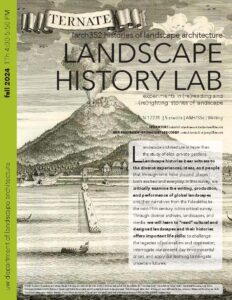 Elizabeth Umbanhowar
Elizabeth Umbanhowar
5 credits, A&H/SSc+ Writing
TTH 4:00-5:50
SLN: 17231
Landscape architecture is more than the study of elite, private gardens. Landscape histories bear witness to the diverse experiences, ideas, and people that, through time, have shaped places both exalted and everyday. In this survey, we critically examine the writing, production, and performance of global landscapes and their narratives from the Paleolithic to the mid-19th century in this critical survey. Through diverse archives, landscapes, and media, we will learn to “read” cultural and designed landscapes and their histories offers important life skills: to challenge the legacies of colonialism and oppression, interrogate our present-day environmental crises, and apply our learning to navigate uncertain futures.
L Arch 498A Sensory Design
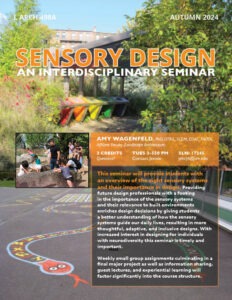 Amy Wagenfeld
Amy Wagenfeld
3 credits
T 3:00 – 5:50 pm
SLN: 17245
This seminar will provide students with an overview of the eight sensory systems and their importance in design. Providing future design professionals with a footing in the importance of the sensory systems and their relevance to built environments enriches design decisions by giving students a better understanding of how the sensory systems guide our daily lives, resulting in more thoughtful, adaptive, and inclusive designs. With increased interest in designing for individuals with neurodiversity this seminar is timely and important.
Weekly small group assignments culminating in a final major project as well as information sharing, guest lectures, and experiential learning will factor significantly into the course structure.
L Arch 498B Drawing Seminar
Course topic + information coming in summer.
1 Credit Workshop (by Application)
See Drawing in Design page for more information
L Arch 498C Empathetic Design
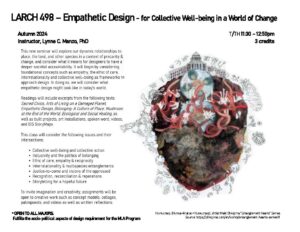
Lynne Manzo
3 credits
TTh 11:30 – 12:50
SLN: 23592
Fulfills MLA Socio-political Dimensions of Designs
This new seminar will explore our dynamic relationships to place, the land, and other species in a context of precarity & change, and consider what it means for designers to have a deeper societal accountability. It will begin by considering foundational concepts such as empathy, the ethic of care, interrelationality and collective well-being as frameworks to approach design. In doing so, we will consider what empathetic design might look like in today’s world.
Readings will include excerpts from the following texts. Sacred Civics, Arts of Living on a Damaged Plant, Empathetic Design, Belonging: A Culture of Place, Mushroom at the End of the World, Ecological and Social Healing, as well as built projects, art installations, spoken word, videos, and GIS StoryMaps.
This class will consider the following issues and their intersections:
- Collective well-being and colelctive action
- Inclusivity and the politics of belonging
- Ethic of care empathy & reciprocity
- Interrelationality & multispecies entanglements
- Justice-to-come and visions of the oppressed
- Recognition, reconciliation & reparations
- Storytelling for a hopeful future
To invite imagination and creativity, assignments will be open to creative work such as concept models, collages, palimpsests, and videos as well as written reflections.
L Arch 498E Urban Forestry
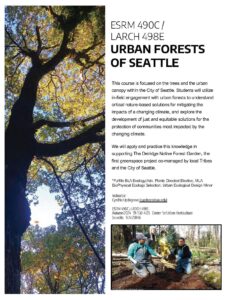 Cynthia Updegrave
Cynthia Updegrave
3 credits
Th 1:30 – 4:20
SLN: 23846
Fulfills BLA Ecology/Adv. Plants Directed Elective, MLA BioPhysical Ecology Selection, Urban Ecological Design Minor
This course is focused on the trees and the urban canopy within the City of Seattle. Students will utilize in-field engagement with urban forests to understand critical nature-based solutions for mitigating the impacts of a changing climate, and explore the development of just and equitable solutions for the protection of communities most impacted by the changing climate.
The course will emphasize the human dimensions both historically and currently within urban forests.Topics will include the many ways ecosystems support human health and well-being, the impacts of colonization, urbanization and social policies on ecosystem fragmentation, and connections between disparities in canopy cover and human health.
We will apply and practice this knowledge in supporting a community-based Native Forest Garden, the first greenspace project co-managed by local Tribes and the City of Seattle.
L Arch 300: Introduction to
Landscape Architecture
Shaunta Butler
6 credits A&H, fulfills BLA prerequisite
MWF 1:30-5:20, Summer full term (A + B)
SLN: 11858
LARCH300 is an overview of the broad spectrum of the landscape architecture profession. Students will be introduced to the creative design process via contemporary methods, applications, and practices of landscape design. They will develop the basic skills and fundamental concepts of landscape architectural design and explore site design through projects that require them to draw, research, build, analyze, collaborate, and present ideas that encompass various facets of the field.
Spring 2024 Courses Open to Non Majors + Special Topics
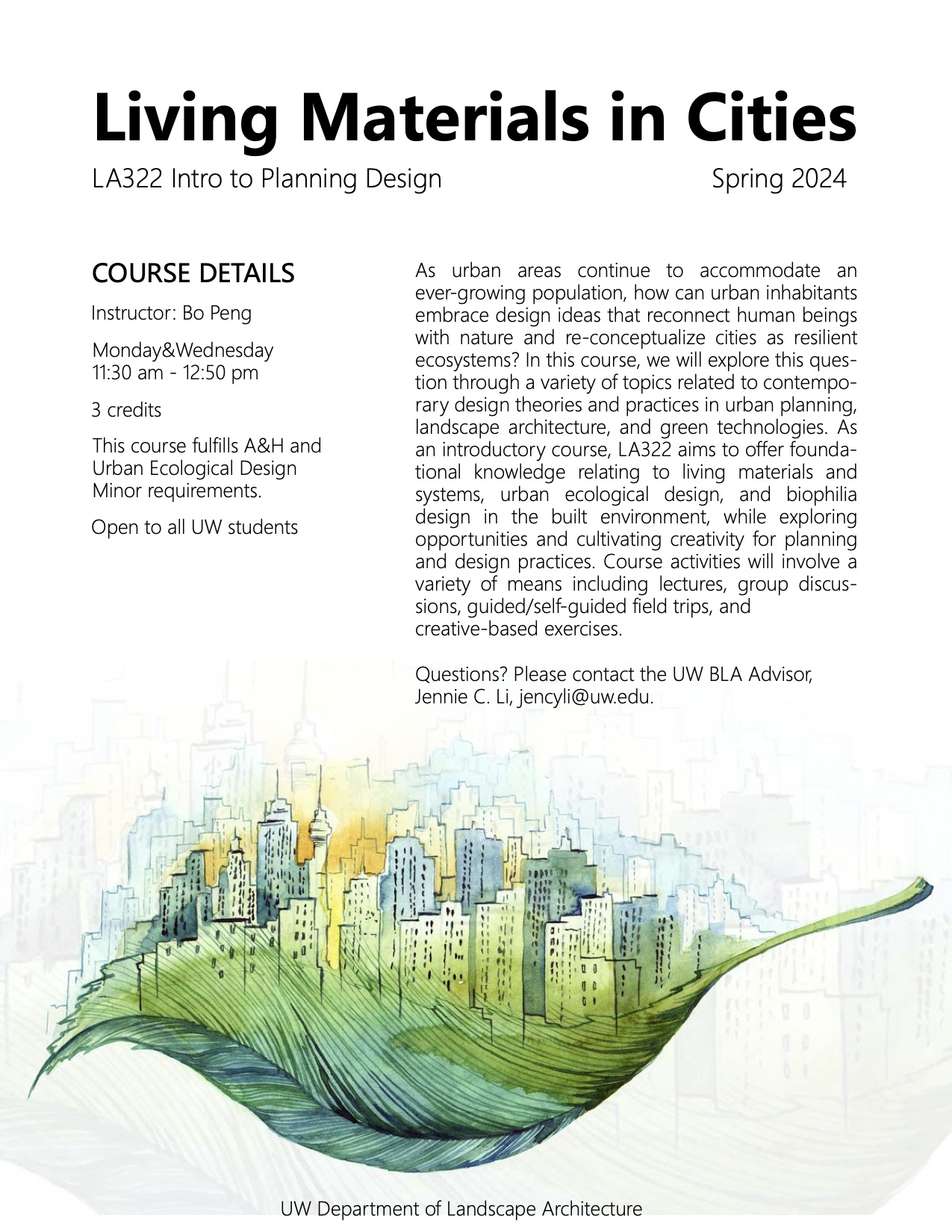
L Arch 322: Intro to Planting Design
Bo Peng
3 Credits A&H
MW 11:30-12:50
SLN 15981
As urban areas continue to accommodate an ever-growing population, how can urban inhabitants embrace design ideas that reconnect human beings with nature and re-conceptualize cities as resilient ecosystems? In this course, we will explore this question through a variety of topics related to contemporary design theories and practices in urban planning, landscape architecture, and green technologies. As an introductory course, LA322 aims to offer foundational knowledge relating to living materials and systems, urban ecological design, and biophilia design in the built environment, while exploring opportunities and cultivating creativity for planning and design practices. Course activities will involve a variety of means including lectures, group discussions, guided/self-guided field trips, and creative-based exercises.
 L Arch 363: Ecological Design and Planning (Undergraduate)
L Arch 363: Ecological Design and Planning (Undergraduate)
Ken Yocom
3 Credits NSc
TTh 10:00-11:20
SLN 15982
LARCH 363 offers an introduction into the complex field of ecological design and planning which integrates ecological research and knowledge into design and planning projects and applications. The educational experience supports all students interested applied approaches for improving the sustainability and resilience of urban and rural places with an emphasis on systems thinking, ecological rehabilitation and restoration, and creative problem-solving.
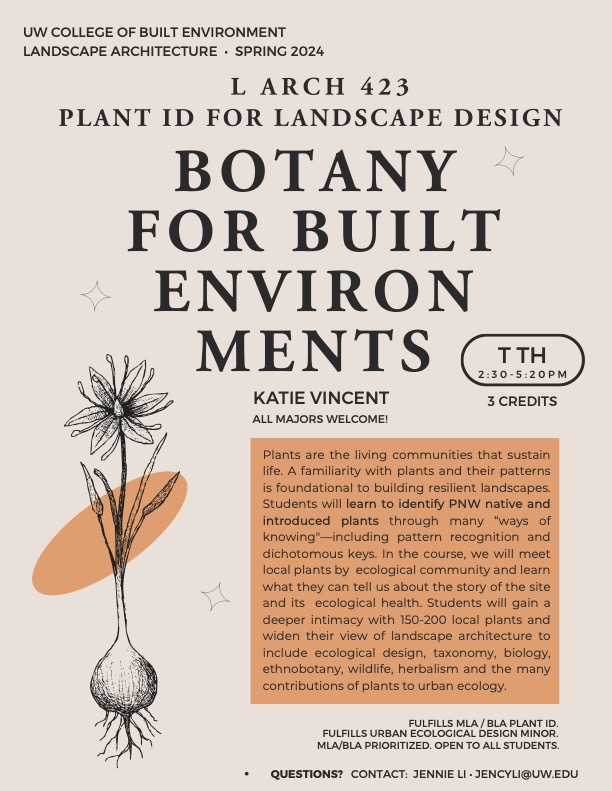 L Arch 423: Plant Identification and Management
L Arch 423: Plant Identification and Management
Katie Vincent
5 Credits
TTh 2:30-5:20
SLN 15984
Plants are the living communities that sustain life. A familiarity with plants and their patterns is foundational to building resilient landscapes. Students will learn to identify PNW native and introduced plants through many “ways of knowing”—including pattern recognition and dichotomous keys. In the course, we will meet local plants by ecological community and learn what they can tell us about the story of the site and its ecological health. Students will gain a deeper intimacy with 150-200 local plants and widen their view of landscape architecture to include ecological design, taxonomy, biology, ethnobotany, wildlife, herbalism and the many contributions of plants to urban ecology.
 L Arch 454: History of Urban Landscapes
L Arch 454: History of Urban Landscapes
Elizabeth Umbanhowar
5 Credits A&H or SSc
MWF 10:00-11:20
SLN 15987
History of Urban Landscapes: The Nature of Cities we will examine the entangled narratives of colonialization, race, capitalism, industrialization, and land. And explore the role of identity, memory, technology, design and the more-than-human world in shaping urban form and novel ecologies. Participants will hone vital skills in critical design thinking and observation, research and analysis, representation and communication. We will also experiment with multimedia methods and cultivate proficiencies in imagination, interpretation, and empathy. In so doing, we prepare ourselves to act as effective, thoughtful, creative, and agile agents and advocates in the landscapes we inhabit.
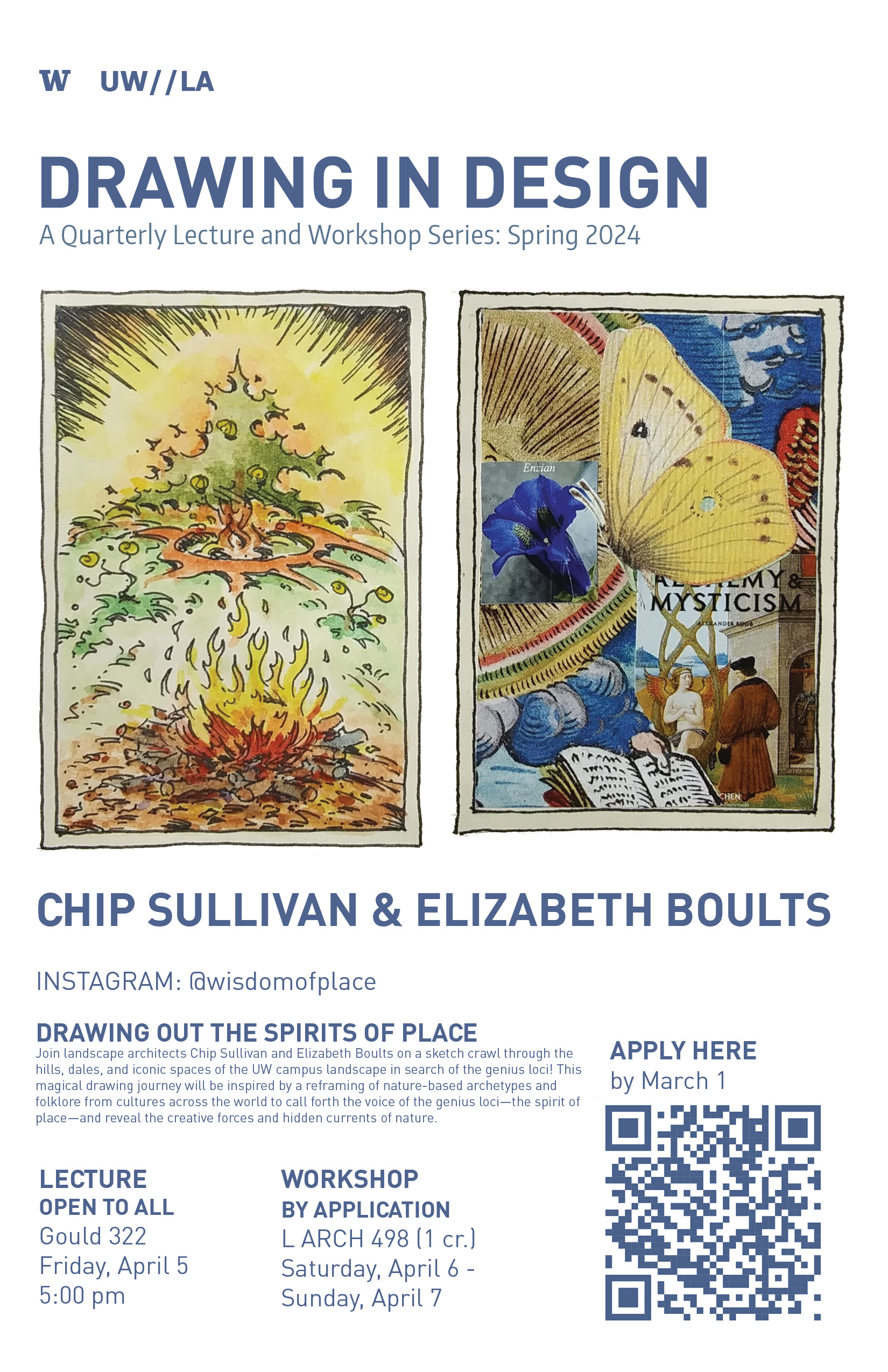
L Arch 498A: Drawing in Design Workshop
Chip Sullivan, Elizabeth Boults
1 Credit Workshop
See Drawing in Design page for more information
 L Arch 498B: Global Built Environments and Health Seminar
L Arch 498B: Global Built Environments and Health Seminar
Coco Alcaron, Hiwot Zewdie
1 Credit Seminar
Th 11:30-12:20
SLN 15991
The impact of the built environment is increasingly relevant for addressing contemporary health challenges globally. This seminar series will convene subject matter experts across disciplines, institutions, and countries to delve into topics related to healthy urban design.

L Arch 498C: The Practice of Community Engagement
Eric Higbee
3 Credit Seminar
TTh 1:30-2:50
SLN 21384
Sweeping epidemics of polarization, loneliness, and social fragmentation have dramatically transformed the social context for working with communities. How can shapers of the built environment practice effective community engagement in this new social climate? More importantly, how can community engagement be a counterforce that helps reverse our troubling social trajectory and leave a lasting positive impact on the communities we serve?
This course will explore the current and future practice of community engagement. We will examine the social psychology of bridging identity groups and explore community engagement’s potential to cultivate shared identities, tolerance, and belonging in the places where we live. We will also learn and practice methods of community engagement, including process design, community event structures, meeting facilitation, and more.
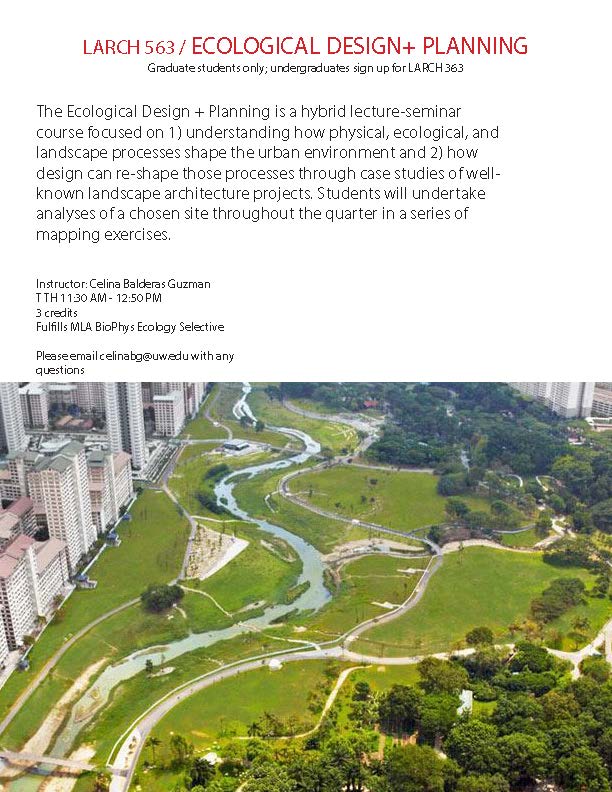
L Arch 563: Ecological Design and Planning (Graduate)
Celina Balderas Guzman
3 Credits
TTh 11:30 – 12:50
SLN 15996
The Ecological Design + Planning is a hybrid lecture-seminar course focused on 1) understanding how physical, ecological, and landscape processes shape the urban environment and 2) how design can re-shape those processes through case studies of well-known landscape architecture projects. Students will undertake analyses of a chosen site throughout the quarter in a series of mapping exercises.
L Arch 300: Introduction to Landscape Architecture
Shaunta Butler
6 credits A&H
MWF 1:30-5:20
SLN: 16191
LARCH300 is an overview of the broad spectrum of the landscape architecture profession. Students will be introduced to the creative design process via contemporary methods, applications, and practices of landscape design. They will develop the basic skills and fundamental concepts of landscape architectural design and explore site design through projects that require them to draw, research, build, analyze, collaborate, and present ideas that encompass various facets of the field.
L Arch 353: Modern Landscape Architecture Histories
Elizabeth Umbanhowar
5 credits A&H/SSc+Writing
TTh 4:00-6:20
SLN: 16192
This course explores landscape sites, systems, and symbols from the early 19th century until the present moment, stressing the intersections and entanglements of people and place in history with current politics, experiences, and ecologies. Together we will interrogate historic narratives and examine both familiar and new landscapes, while re-centering global geographies and marginalized voices that help us make relevant the past in our Anthropocene “now.” Through creative “lab” exercises, diverse media, and collaborative processes, we will critically examine the writing, production, and performance of landscape and its histories thematically through the diverse lenses of: power and ownership; memory and representation; knowledge and experience; labor and production; materiality and technological innovation; climate disruption and social change; identity and emotion; and race, class, and gender.
L Arch 361: Human Experience of Place
Jeff Hou, Bo Peng
3 credits A&H/SSc+Diversity
TTh 10:00-11:20
SLN: 16194
The version of L ARCH 361 this year will examine the human experience of place in the context of city design. The complexity of cities today requires design investigations that address not only the physical forms but also the social and political forces that shape the built environment. This course examines the multiple and often competing forces that influence the making of contemporary cities and the human experience of place. As a survey course, it investigates different paradigms and visions of cities, contested meanings and understandings of urban space, the social and political processes of placemaking, and everyday experiences and imaginaries. It sees the urban environment, or cityscape, as a continuum of ideas, movements, processes, and change. Furthermore, it questions the conventional
notion of design and examines a wider repertoire of spatial practices. Cases around the world including North America, Asia, Europe, and Latin America are introduced to contrast and compare design practices and cultural contexts. While exploring the broader processes of city-making, the course also explores specific design strategies and tactics that could begin to negotiate the competing social and spatial forces in the contemporary urban environment. This class fulfills the BLA and Urban Ecological Design Minor requirements.
L Arch 498B: Urban Forests of Seattle
Cynthia Updegrave
3 credits
Th 1:00-3:50
SLN: 16202
This course will be focused on the trees and the urban canopy within the City of Seattle. Students will utilize in-field engagement with the urban trees of Seattle to understand critical nature-based solutions for mitigating the impacts of a changing climate.
The course will cover the geologic, climatic, and ecological origins of Puget Sound ecosystems with an emphasis on the human dimensions of these ecosystems both historically and currently within urban forests.
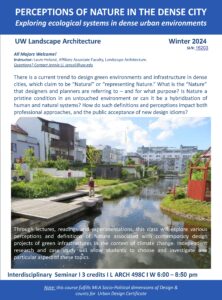
L Arch 498C: Perceptions of Nature in the Dense City
Laure Heland
3 credits
W 6:00-8:50
SLN: 16203
There is a current trend to design green environments and infrastructure in dense cities, which claim to be “Natural” or “representing Nature.” What is the “Nature” that designers and planners are referring to – and for what purpose? Is Nature a pristine condition in an untouched environment or can it be hybridization of human and natural systems? How do such definitions and perceptions impact perceptions impact both professional approaches, and the public acceptance of new design idioms?
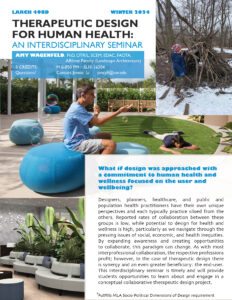
L Arch 498C: Therapeutic Design for Human Health
Amy Wagenfeld
3 credits
M 6:00-8:50
SLN: 16204
What if design was approached with a commitment to human health and wellness focused on the user and wellbeing?
Designers planners, healthcare, and public and population health practitioners have their own unique perspectives and each typically practice siloed from the others. Reported rates of collaboration between these groups is low, while potential to design for health and wellness is high, particularly as we navigate through the pressing issues of social, economic, and health inequalities. By expanding awareness and creating opportunities to collaborate, this paradigm can change. As with most interprofessional collaboration, the respective professions profit; however, in the case of therapeutic design there is synergy and an even greater beneficiary: the end-use. This interdisciplinary seminar is timely and will provide students opportunities to learn about and engage in a conceptual collaborative therapeutic design project.
L Arch 212: Designing the Future
Keith Harris
3 credits, A&H/SSc
MWF 1:00 – 2:20 PM
SLN: 17159
How do landscape architects and other designers shape our cities, our lives, and our futures? Through fieldwork, hand-on activities, research, and discussion, this course explores innovative and interdisciplinary design thinking and practice that addresses critical human issues from the local to the global scale.
L Arch 341: Site Design and Planning
Eric Higbee
3 credits, A&H
TTh 11:30–12:50
SLN : 17163
“Site design and planning is the art and science shaping the places we live and work. Its aim is foundationally moral and aesthetic: to enhance everyday life.”
– Lynch and Hack, Site Planning
Through field trips, lectures, drawing, and discussion, this course explores the art and science of shaping sites. Balancing broad conceptual frameworks with practical tools, we will survey the ecological, cultural, political and technical dimensions that influence site design and planning in contemporary practice.
L Arch 352: History of Landscape Architecture
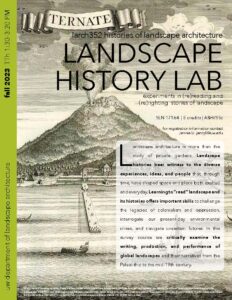 Elizabeth Umbanhowar
Elizabeth Umbanhowar
5 credits A&H/SSc+Writing
TTh 1:30–3:20
SLN: 17164
Landscape architecture is more than the study of private gardens. Landscape histories bear witness to the diverse experiences, ideas, and people that, through time, have shaped space and place both exalted and everyday. Learning to “read” landscape and its histories offers important skills to challenge the legacies of colonialism and oppression, interrogate our present-day environmental crises, and navigate uncertain futures. In this survey course we critically examine the writing, production, and performance of global landscapes and their narratives from the Paleolithic to the mid-19th century.
L Arch 498A: Sensory Design: An Interdisciplinary Seminar
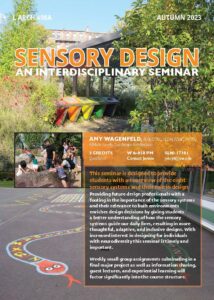 Amy Wagenfeld, PhD, OTR/L, SCEM, EDAC, FAOTA, Affiliate Faculty (Landscape Architecture)
Amy Wagenfeld, PhD, OTR/L, SCEM, EDAC, FAOTA, Affiliate Faculty (Landscape Architecture)
3 credits
Tu 6-8:50 pm
SLN: 17181
This seminar is designed to provide students with an overview of the eight sensory systems and their role in design. Providing future design professionals with a footing in the importance of the sensory systems and their relevance to built environments enriches design decisions by giving students a better understanding of how the sensory systems guide our daily lives, resulting in more thoughtful, adaptive, and inclusive designs. With increased interest in designing for individuals with neurodiversity this seminar is timely and important.
Weekly small group assignments culminating in a final major project as well as information sharing, guest lectures, and experiential learning will factor significantly into the course structure.
Summer 2023 Courses

L Arch 300: Introduction to Landscape Architecture
Vincent Javet, Rich Desanto
6 credits, A&H
MWF 1:10 – 5:10 PM
SLN: 11891
Questions? contact Jennie Li, jencyli@uw.edu
This is the only prerequisite course required to apply to the BLA Major
This studio provides an introduction into the methods and practice of integrating landscape architectural design into urban environments. This is a heavily collaborative class in which students work closely with instructors and one another to discuss, observe, and design local environments. You will have a portfolio of works ready for the BLA application by the end of this course.
 L Arch 322: Intro to Planting Design
L Arch 322: Intro to Planting Design
Kristi Park
3 cr. A&H
MW 11:30-12:50 (M: async lecture, W: in person field trips/discussion)
SLN: 16050
As human populations face climate change, can urban inhabitants embrace design ideas that reconceptualizes cities as resilient ecosystems and reconnect humans with nature? In this course, we will explore this question through topics related to contemporary urban planning, design, construction, and maintenance of built environments. L Arch 322 encourages students to explore a wide variety of topics through engaging with online-presentations, podcasts, readings, self-guided urban field trips and participation in group discussions. Assignments for this course will involve a variety of means including art-making, graphic novel development, design-thinking and observational skills.
 L Arch 363: Ecological Design and Planning
L Arch 363: Ecological Design and Planning
Jenn Engelke
3 cr. NSc, BLA theory requirement
undergraduates only, graduates sign up for L Arch 563
SLN: 16051
Introduction to landscape ecological theory applied to urban environments and design. This course will compare different vocabularies and theories used to describe landscape structure and function. Discussion will also include design theories that have sought to re-center landscape, planning and design around the goal of achieving ecological sustainability. Coursework will include the following:
- Guest lectures from practitioners and field experts
- Field trips to explore site analysis
- Discussions and critical engagement with peers
 L Arch 423: Plant ID & Management
L Arch 423: Plant ID & Management
Botany for Built Environments
Katie Vincent
TTh 2:30-5:20
3 cr. BLA plant ID requirement
SLN: 16053
Plants are the living communities that sustain life. A familiarity with plants and their culture is foundational to building resilient landscapes. Students will learn to identify and relate to PNW native and introduced plants through multiple ways of “knowing,” including pattern recognition and dichotomous keys. The course will explore ethnobotanical relationships with plants, as well as biocultural, ecological and maintenance considerations. This course also offers students the opportunity to widen their view of landscape architecture to include ecological design, horticulture, taxonomy, and the many contributions of plants to urban ecology.
 L Arch 454: History of Urban Landscapes
L Arch 454: History of Urban Landscapes
The Nature of Cities
Elizabeth Umbanhowar
MWF 11:30-12:50
5 cr. SSc, optional W, BLA history requirement
SLN: 16056
In the tumult of COVID-19, escalating social divisions, and the Anthropocene, the history of urban landscapes offers a critical vantage from which to glimpse where we have been so that we can envision and have agency in where we are going. In this course, we will interrogate the role of climate change and injustice within the design histories of cities. By comparing historic and contemporary urban narratives, we will engage in meaningful conversations about how histories are produced and disseminated, and why interpretation of the past matters more than ever today. Through the History of Urban Landscapes: The Nature of Cities we will examine the entangled narratives of colonialization, race, capitalism, industrialization, and land. And interrogate the role of identity, memory, technology and design in shaping urban form and novel ecologies. Participants will hone critical skills in research, reading, writing, analysis, and empathy. We will also experiment with multimedia methods and cultivate proficiencies in imagination, interpretation, and representation. In so doing, we prepare ourselves to act as effective, thoughtful, creative, and agile design agents and advocates in the face of challenging and unpredictable futures.
 L Arch 498B: Repairing Waste Relations
L Arch 498B: Repairing Waste Relations
Catherine DeAlmeida
WF, 9:00-10:20
3 cr.
SLN: 16058
Challenge
Current waste management practices create landfills and polluted sites in which materials and resources are forever removed from potential systems of recovery. Such waste landscapes create vulnerability within and surrounding their sites, which are typically relegated to the peripheries of urban environments along with marginalized communities, contributing to waste injustice. How might built environments become more equitable if systems of recovery received more investment than systems of extraction? Although Circular Economy (CE) calls for waste reduction and reuse, direct applications to specific neighborhoods with unique needs are vague, especially communities impacted by waste injustice. What is the role of CE in the design and planning of built environments, particularly when considering waste landscapes, and the communities affected by them?
Waste shapes relational webs between humans, more-than-humans, and their places; it connects everything to landscape. Given these waste relations, landscape offers unique opportunities for reimagining CE frameworks as community-centered. We will explore these potentials as we unravel the blurry, ambiguous, culturally constructed attitudes toward waste, its spatial and materials implications, and uncover its possibilities to address environmental and climate justice.
Process
The course will use guest lecturers, readings, class discussions, field trip(s), and a quarter- long case study research project to explore the spatial and material performance (or lack thereof) of waste. Case studies will include a range of zero waste initiatives, strategies, and technologies, and students will evaluate their policies, audiences, strategies, frameworks, costs, and possibilities for adaptation to other contexts. The course meets twice a week, with critical discussions taking place on Wednesdays, and workshops, guest lectures, working sessions, presentations, and field trips taking place on Fridays. Students will also write in-class reflections related to evolving perspectives on course content periodically throughout the quarter.
 L Arch 563: Ecological Design +Planning
L Arch 563: Ecological Design +Planning
Celina Balderas Guzman
TTh, 10:00-11:20
3 cr. , Fulfills MLA selective
graduates only, undergraduates sign up for L Arch 363
SLN: 16058
email celinabg@uw.edu with questions
The Ecological Design + Planning seminar focuses on the translation and integration of ecological knowledge into contemporary design theory and practice. Through readings, discussions, and presentations, this class will explore explicit relationships between functional processes and the form of built environments to build deeper understanding of contemporary topics such as urban climate adaptation, green infrastructure, and designing for resilience.
Winter 2023 Courses for Non Majors + Special Topics
L ARCH 353 | L ARCH 553: Histories of Modern Landscape Architecture
LAND | SCAPES in FLUX public spaces, personal histories in the anthropocene
MWF 11:30-12:50
Elizabeth Umbanhowar, umbanhow@uw.edu
5 credits, A&H / SSc + Writing
(SLN: 16438, Honors SLN: 16439)
Contact Jennie Li, jencyli@uw.edu for add codes.
This course explores landscape sites, systems, and symbols from the early nineteenth century until the present moment, stressing the intersections and entanglements of history with current politics, experiences and ecologies. Together we will interrogate historic narratives and examine both familiar and new landscapes, while re-centering global geographies and marginalized voices that help us make relevant the past in our Anthropocene “now.” Through creative exercises, diverse media and collaborative processes, we will critically examine the writing, production, and performance of landscape and its histories thematically through the diverse lenses of: power and ownership; memory and representation; knowledge and experience; labor and production; materiality and technological innovation; climate disruption and social change; identity and emotion; and race, class and gender.
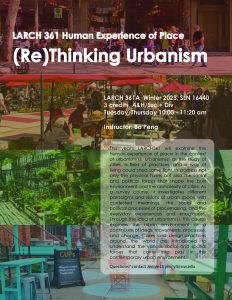
L ARCH 361: Human Experience of Place: (Re) Thinking Urbanism
(Undergraduate)
TTh 10:00-11:20
Bo Peng
3 credits, A&H / SSc + Diversity (SLN: 16440)
All Majors Welcome!
This year’s course will examine the human experience of place in the context of urbanism(s). Urbanism(s) as the study of cities, a field of practices, and a way of living could shed some light to address not only the physical forms but also the social and political forces that shape the built environment and the complexity of cities. As a survey course, it investigates different paradigms and visions of urban space with contested meanings, the social and political processes of placemaking, and the everyday experiences and imaginaries. Through the idea of urbanism(s), this course explores the urban environment as a continuum of ideas, movements, processes, and change. Cases and design practices around the world are introduced to understand the various social and spatial forces that come into play in the contemporary urban environment.
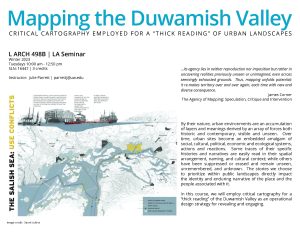
L ARCH 498B: Mapping the Duwamish Valley
T 10:00 AM -12:50 PM
Julie Parrett parretj@uw.edu
3 credits, (SLN: 16447)
…its agency lies in neither reproduction nor imposition but rather in uncovering realities previously unseen or unimagined, even across seemingly exhausted grounds. Thus, mapping unfolds potential; it re-makes territory over and over again, each time with new and diverse consequence.
James Corner
The Agency of Mapping: Speculation, Critique and Intervention
By their nature, urban environments are an accumulation of layers and meanings derived by an array of forces both historic and contemporary, visible and unseen. Over time, urban sites become an embedded amalgam of social, cultural, political, economic and ecological systems, actions and reactions. Some traces of their specific histories and narratives are easily read in their spatial arrangement, naming, and cultural context; while others have been suppressed or erased and remain unseen unremembered, and unknown. The stories we choose to prioritize within public landscapes directly impact the identity and enduring narrative of the place and the people associated with it. In this course, we will employ critical cartography for a “thick reading” of the Duwamish Valley as an operational design strategy for revealing and engaging.
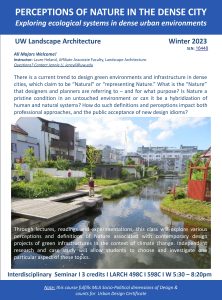
L ARCH 498C: Perceptions of Nature in the Dense City
W 6:00-8:50 PM
Laure Heland heland@uw.edu
3 credits, (SLN: 16448)
Fulfills Socio-Political Dimensions of Design selective for MLA students
There is a current trend to design green environments and infrastructure in dense cities, which claim to be “Natural” or “representing Nature.” What is the “Nature” that designers and planners are referring to – and for what purpose? Is Nature a pristine condition in an untouched environment or can it be a hybridization of human and natural systems? How do such definitions and perceptions impact both professional approaches, and the public acceptance of new design idioms?
Through lectures, readings and experimentations, this class will explore various perceptions and definitions of Nature associated with contemporary design projects of green infrastructures in the context of climate change. Independent research and case study will allow students to choose and investigate one particular aspect of these topics.
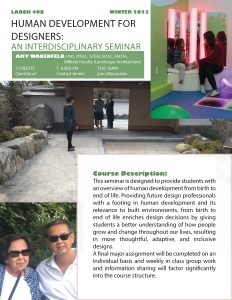
L ARCH 498D: Human Development for Designers
T 6:00-8:50 PM
Dr. Amy Wagenfeld
3 credits, (SLN: 16449)
Questions? contact Jennie Li, jencyli@uw.edu
This seminar is designed to provide students with an overview of human development from birth to end of life. Providing future design professionals with a footing in human development and its relevance to built environments, from birth to end of life enriches design decisions by giving students a better understanding of how people grow and change throughout our lives, resulting in more thoughtful, adaptive, and inclusive designs.
A final major assignment will be completed on an individual basis and weekly in class group work and information sharing will factor significantly into the course structure.
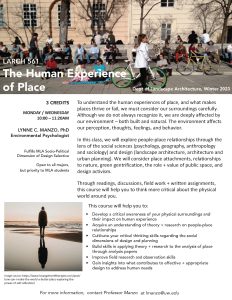
L ARCH 561: Human Experience of Place (Graduate)
MW 10:00-11:20 AM
Lynne Manzo, PhD
Environmental Psychologist
3 credits, (SLN: 16454)
lmanzo@uw.edu – email for add code
Fulfills MLA Socio-Political Dimension of Design Selective
Open to all majors, but priority to MLA students
To understand the human experiences of place, and what makes places thrive or fail, we must consider our surroundings carefully. Although we do not always recognize it, we are deeply affected by our environment – both built and natural. The environment affects our perception, thoughts, feelings, and behavior. In this class, we will explore people-place relationships through the lens of the social sciences (psychology, geography, anthropology and sociology) and design (landscape architecture, architecture and urban planning). We will consider place attachments, relationships to nature, green gentrification, the role + value of public space, and design activism.Through readings, discussions, field work + written assignments, this course will help you to think more critical about the physical world around you.
This course will help you to:
•Develop a critical awareness of your physical surroundings and their impact on human experience•Acquire an understanding of theory + research on people-place relationships•Cultivate your critical thinking skills regarding the social dimensions of design and planning •Build skills in applying theory + research to the analysis of place through analysis papers•Improve field research and observation skills•Gain insights into what contributes to effective + appropriate design to address human needs
Autumn 2022 Courses for Non Majors + Special Topics
L ARCH 212 | Designing the Future
Instructor TBD
3 credits, VLPA/I&S
MWF 1:00 – 2:50 PM
SLN: 17203
Questions? contact Jennie Li, jencyli@uw.edu
How do landscape architects and other designers shape our ciis, out lives, and our futures? Through fieldwork, hand-on activities, research, and discussion, this course explores innovative and interdisciplinary design thinking and practice that addresses critical human issues from the local to the global scale.
L ARCH 300 | Intro to Landscape Architecture Design Studio
Instructor TBD
3 credits, VLPA
MWF 1:30-5:30 PM
SLN:17205
Questions? contact Jennie Li, jencyli@uw.edu
This studio provides an introduction into the methods and practice of integrating landscape architectural design into urban environments. This is a heavily collaborative class in which students work closely with instructors and one another to discuss, observe, and design local environments.
L ARCH 341 | Site Design and Planning
Eric Higbee
3 credits, VLPA
TTh 10-11:20 AM
SLN:17207
Questions? contact Jennie Li, jencyli@uw.edu
“Site design and planning is the art and science shaping the places we live and work. Its aim is foundationally moral and aesthetic: to enhance everyday life.” – Lynch and Hack, Site Planning
Through field trips, lectures, and discussion, this course will explore the varied ecological, cultural, political, and technical dimensions of shaping sites for people and the planet.
 L ARCH 352 | Histories of Landscape Architecture
L ARCH 352 | Histories of Landscape Architecture
Landscape History Lab: Experiments in (re)reading and (re)righting stories of landscape
Elizabeth Umbanhowar
5 credits, VLPA/I&S, Writing Credit
TTh 1:30-3:20 PM
SLN:17208
Questions? contact Jennie Li, jencyli@uw.edu
Fulfills BLA/MLA History requirement
Landscape architecture is more than the study of private gardens. Landscape histories bear witness to the diverse experiences, ideas, and people that, through time, have shaped space and place both exalted and everyday. Learning to “read” landscape and its histories offers important skills to challenge the legacies of colonialism and oppression, interrogate our present-day environmental crises, and navigate uncertain futures. In this survey course we critically examine the writing, production, and performance of global landscapes and their narratives from the Paleolithic to the mid-19th century.
 L ARCH 498A | Therapeutic Design for Human Health
L ARCH 498A | Therapeutic Design for Human Health
Dr. Amy Wagenfeld
3 credits
W 6-8:50
SLN:17226
Questions? contact Jennie Li, jencyli@uw.edu
Fulfills MLA Socio-Political Dimensions of Design
All Majors Welcome!
What if design was approached with a commitment to human health and wellness focused on the user and wellbeing?
Designers, planners, healthcare, and public and population health practitioners each have their own unique perspectives and each typically practice siloed from the others. Reported rates of collaboration between these groups is low, while potential to design for health and wellness is high, particularly as we navigate through the pressing issues of social and health inequities. By expanding awareness and creating opportunities to collaborate, this paradigm can change. As with most interprofessional collaboration, the respective professions profit; however, in the case of therapeutic design there is synergy and an even greater beneficiary: the end-user. This interdisciplinary seminar is timely and will provide students opportunities to learn about and engage in a conceptual collaborative therapeutic design project.
L ARCH 498D | Interdisciplinary frameworks for health, ecology, and the built environment
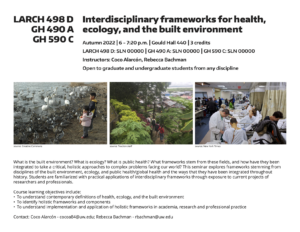
Coco Alarcón, Rebecca Bachman
3 credits
TTh 6-7:20
SLN: 23380
Contact: Coco Alarcón – cocoa84@uw.edu; Rebecca Bachman – rbachman@uw.edu
Fulfills BLA Ecology/UDP Elective
All Majors Welcome!
What is the built environment? What is ecology? What is public health? What frameworks stem from these fields, and how have they been integrated to take a critical, holistic approaches to complex problems facing our world? This seminar explores frameworks stemming from disciplines of the built environment, ecology, and public health/global health and the ways that they have been integrated throughout history. Students are familiarized with practical applications of interdisciplinary frameworks through exposure to current projects of researchers and professionals.
Course learning objectives include:
• To understand contemporary definitions of health, ecology, and the built environment
• To identify holistic frameworks and components
• To understand implementation and application of holistic frameworks in academia, research and professional practice
Summer 2022 Courses for Non Majors + Special Topics
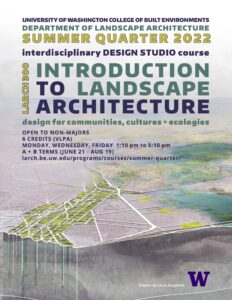
L ARCH 300 | Intro to Landscape Architecture Design Studio
Richard Desanto, Biruk Belay
6 credits, VLPA
MWF 1:30 – 5:30 PM
SLN: 11947
Questions? contact Jennie Li, jencyli@uw.edu
How do landscape architects and other designers shape our ciis, out lives, and our futures? Through fieldwork, hand-on activities, research, and discussion, this course explores innovative and interdisciplinary design thinking and practice that addresses critical human issues from the local to the global scale.
L ARCH 407 | Advanced Studio
Radical Botany: Speculative landscape futures at the intersectionality of plants, people, and place
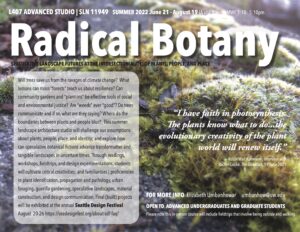
Elizabeth Umbanhowar
6 credits, VLPA/I&S
MWF 1:10 – 5:10 PM, Full Term (A and B)
SLN: 11949
Questions? contact Elizabeth, umbanhow@uw.edu
Open to Advanced Undergraduate and Graduate Students
Will trees save us from the ravages of climate change? What lessons can moss “forests” teach us about resilience? Can community gardens and “plant-ins” be effective tools of social and environmental justice? Are “weeds” ever “good”? Do trees communicate and if so, what are they saying? Where do the boundaries between plants and people blur? This summer landscape architecture studio will challenge our assumptions about plants, people, place, and identity; and explore how can speculative botanical fictions advance transformative and tangible landscapes in uncertain times. Through readings, workshops, fieldtrips, and design experimentations, students will cultivate critical creativities; and familiarities | proficiencies in plant identification, propagation and pathology, urban foraging, guerilla gardening, speculative landscapes, material construction, and design communication. Final (built) projects will be exhibited at the annual Seattle Design Festival August 20-26 https://seadesignfest.org/about-sdf-faq/
Past Selectives +Electives
Winter 2025 MLA Selective Options
Winter 2025 BLA Directed Electives
Autumn 2024 MLA Selective Options
Autumn 2024 BLA Directed Electives
Summer 2024 BLA Directed Electives
Spring 2024 BLA Directed Electives
Spring 2024 MLA Selectives
Winter 2024 BLA Directed Electives
Winter 2024_MLA Selective Options
Autumn 2023 BLA Directed Electives
Autumn 2023_MLA Selective Options
Spring 2023_MLA Selective Options
Spring 2023 BLA Directed Electives
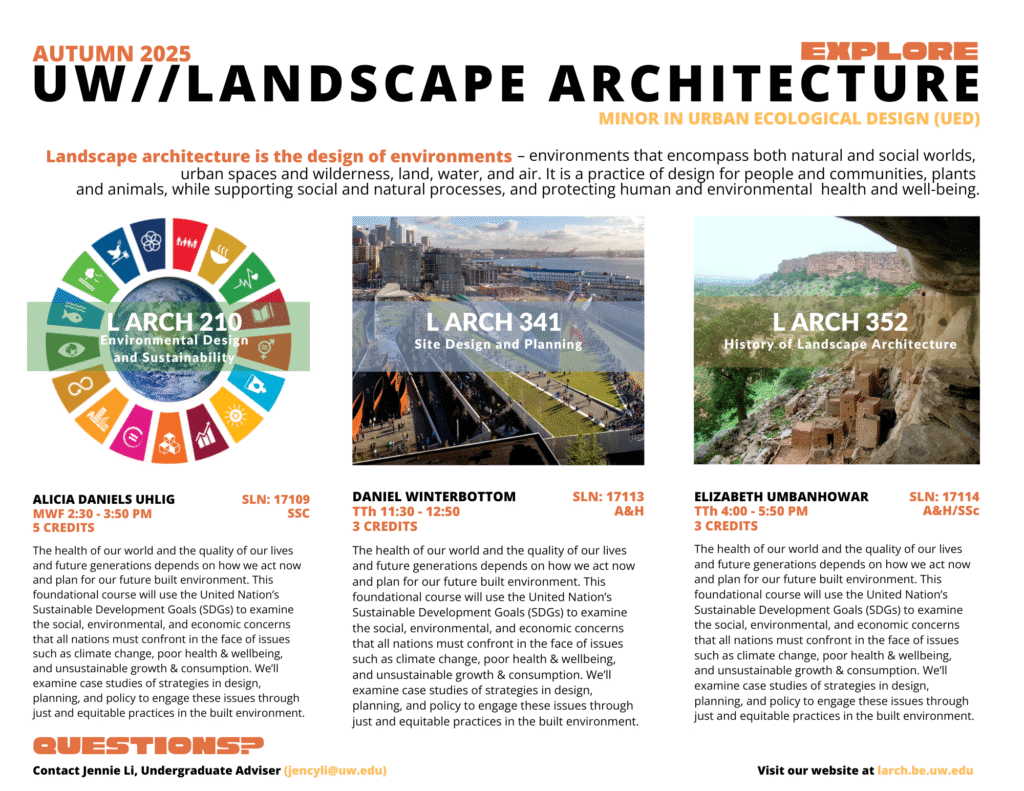

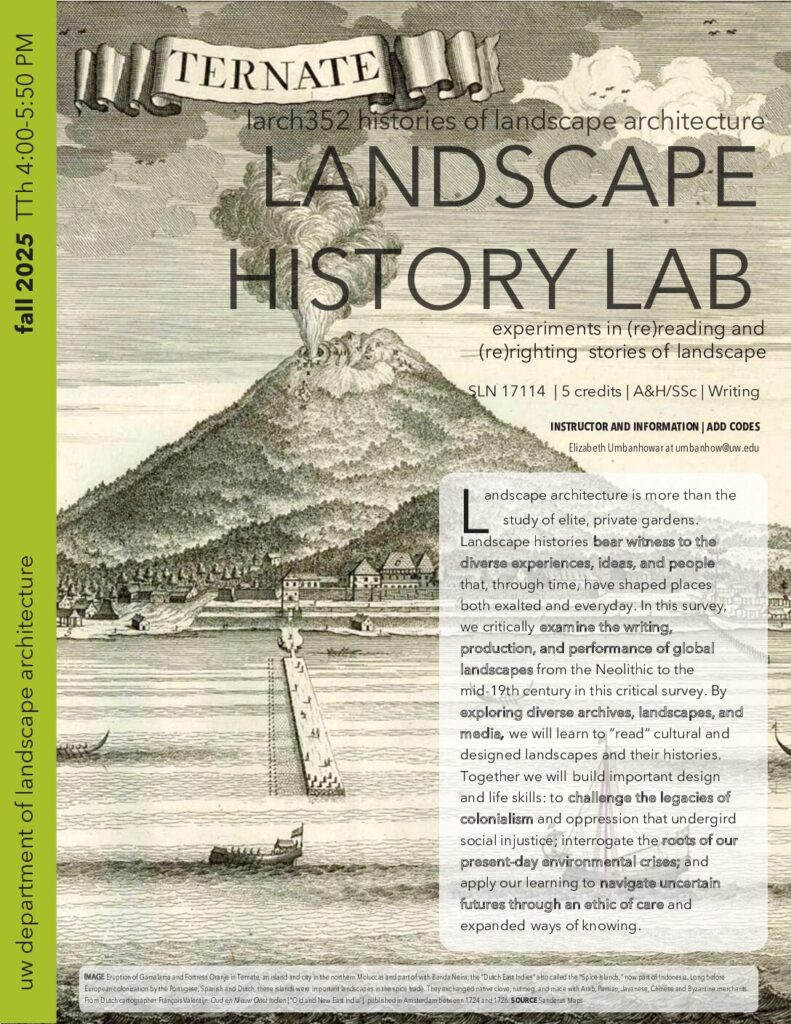
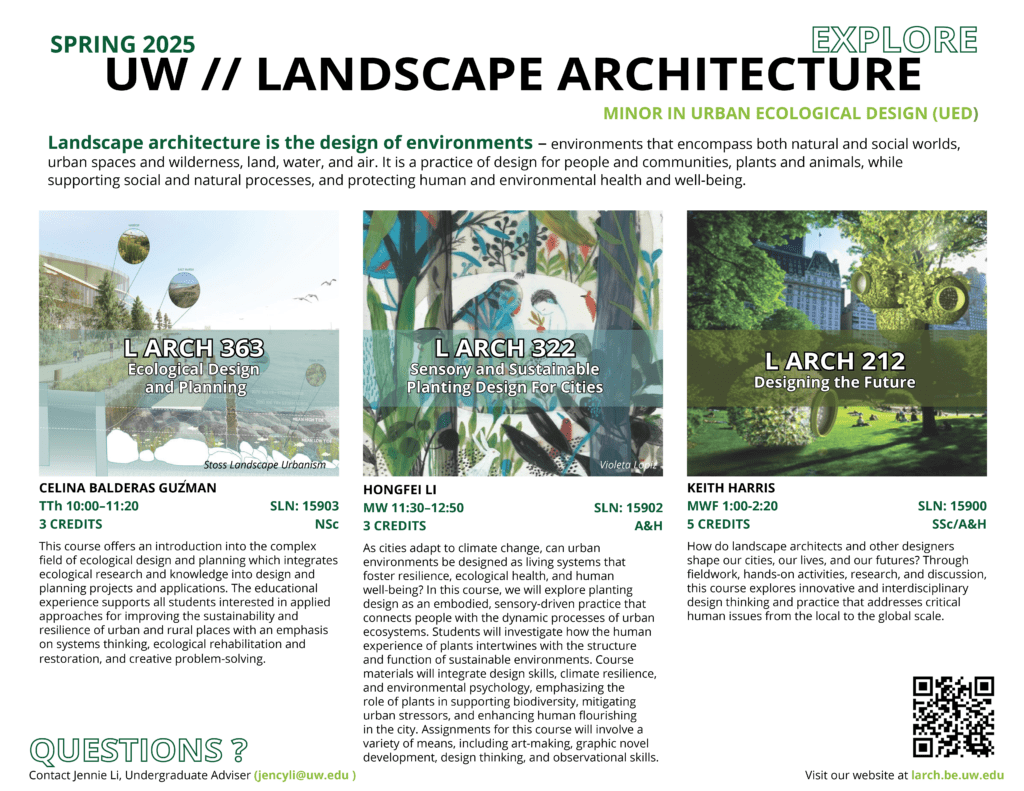
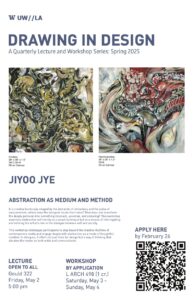
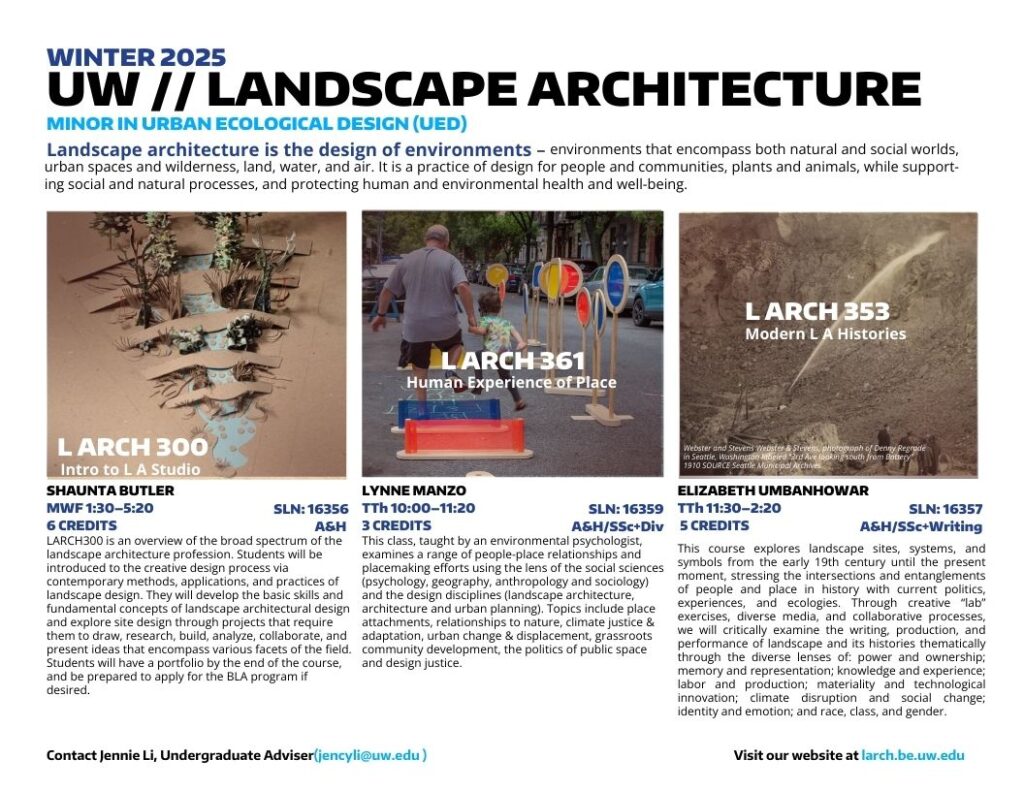
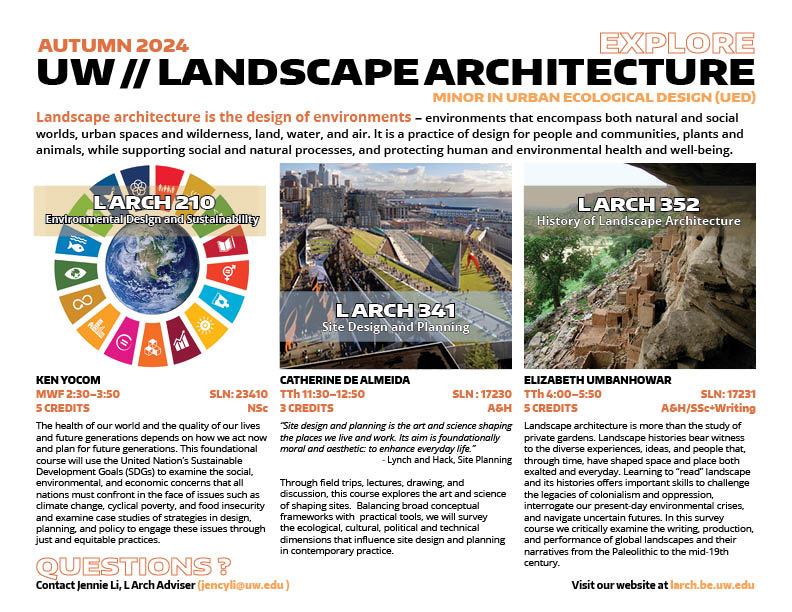
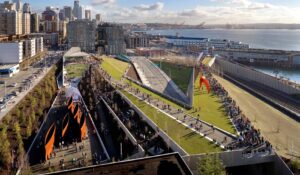
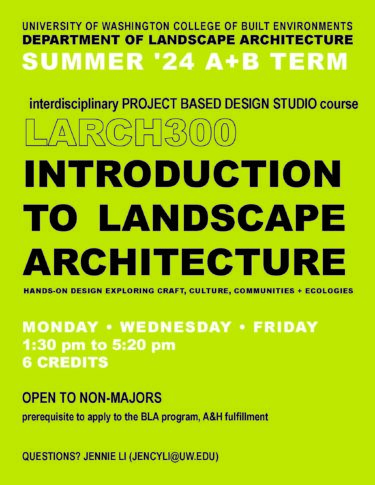
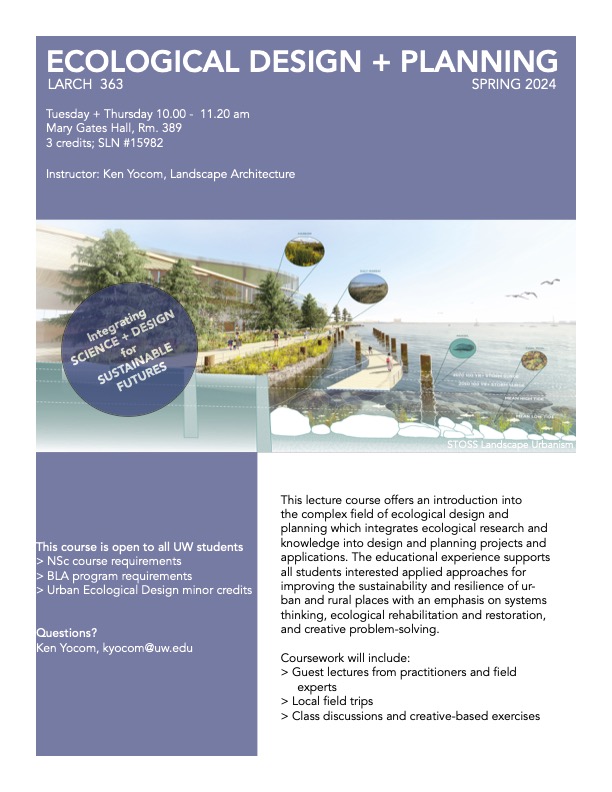 L Arch 363: Ecological Design and Planning (Undergraduate)
L Arch 363: Ecological Design and Planning (Undergraduate)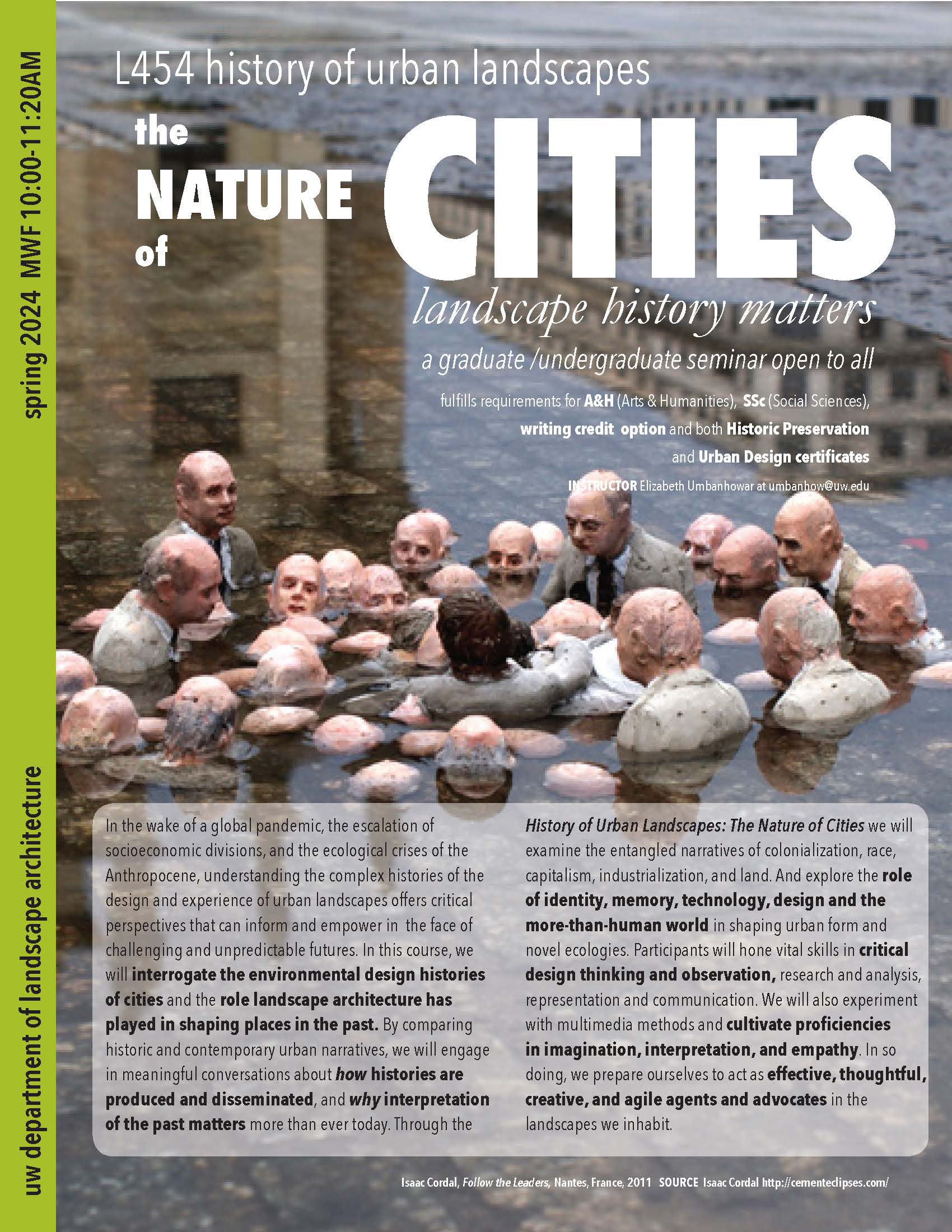 L Arch 454: History of Urban Landscapes
L Arch 454: History of Urban Landscapes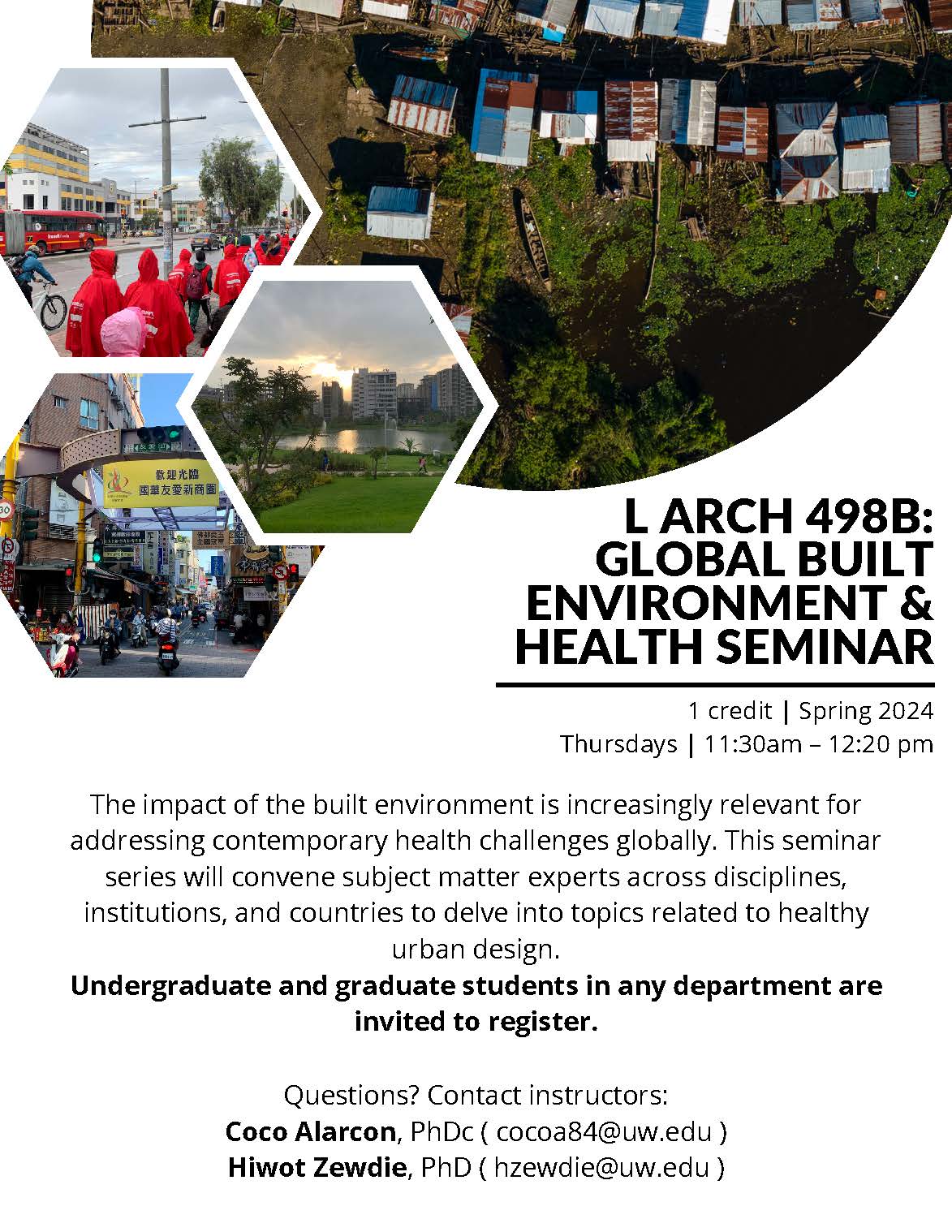 L Arch 498B: Global Built Environments and Health Seminar
L Arch 498B: Global Built Environments and Health Seminar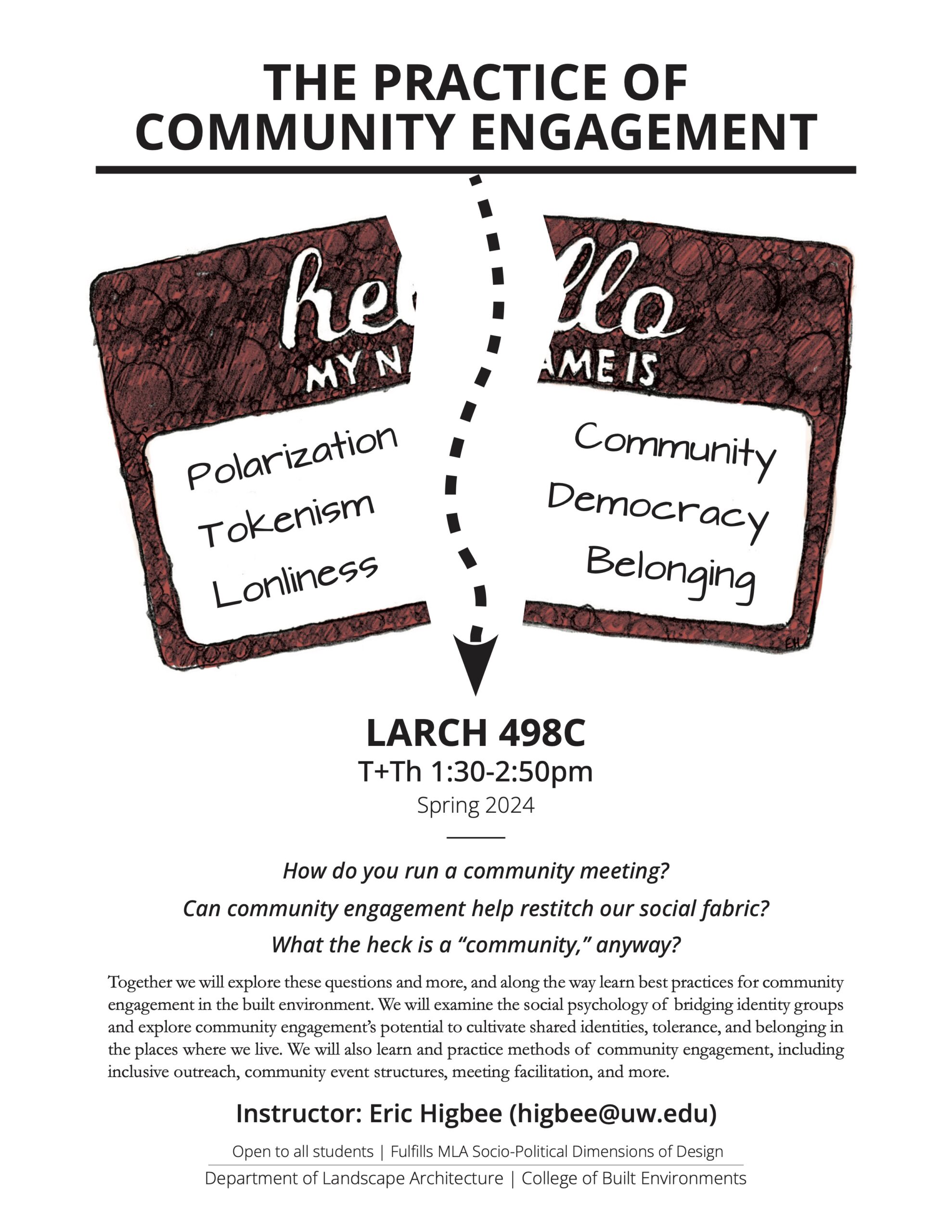
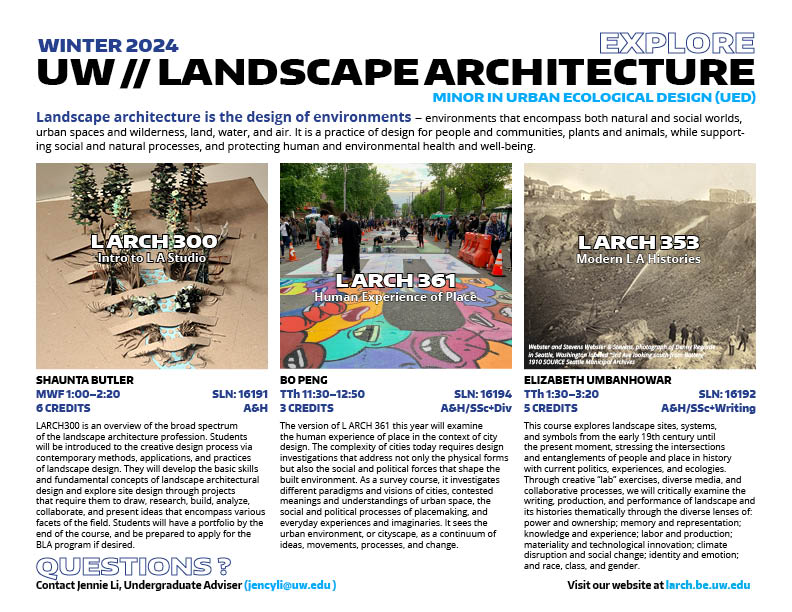
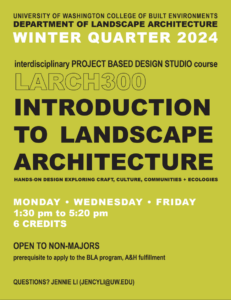
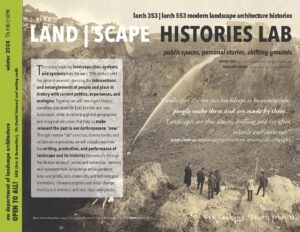
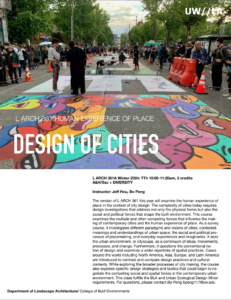
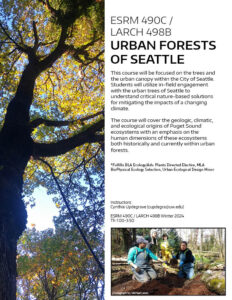
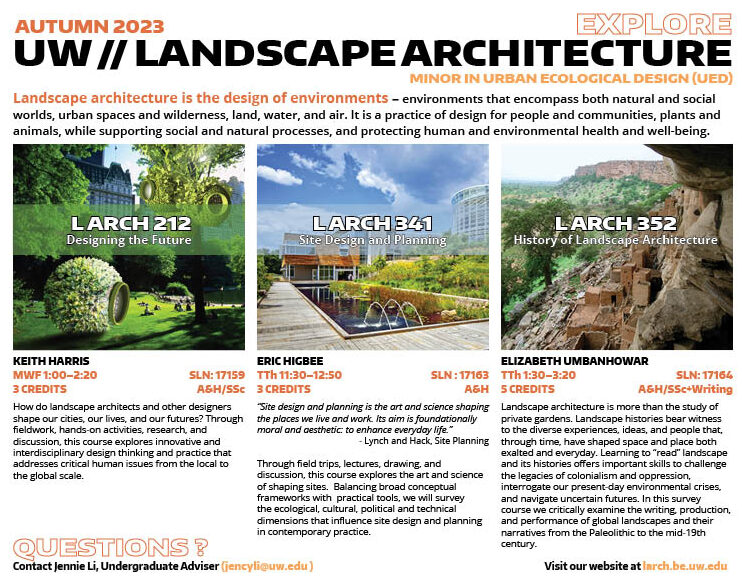
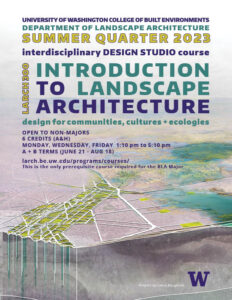
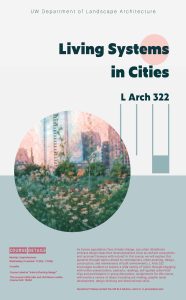
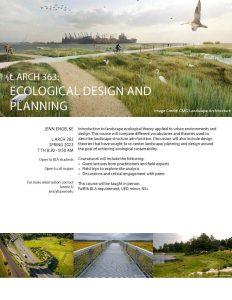
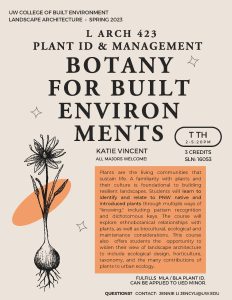
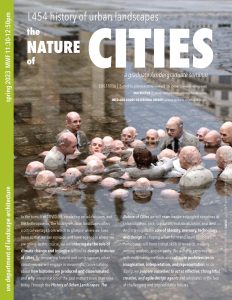
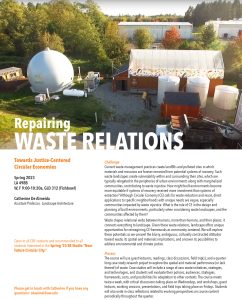
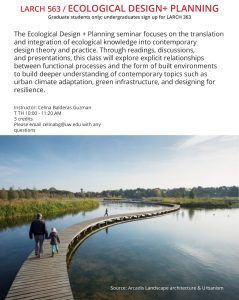
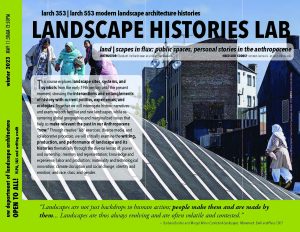
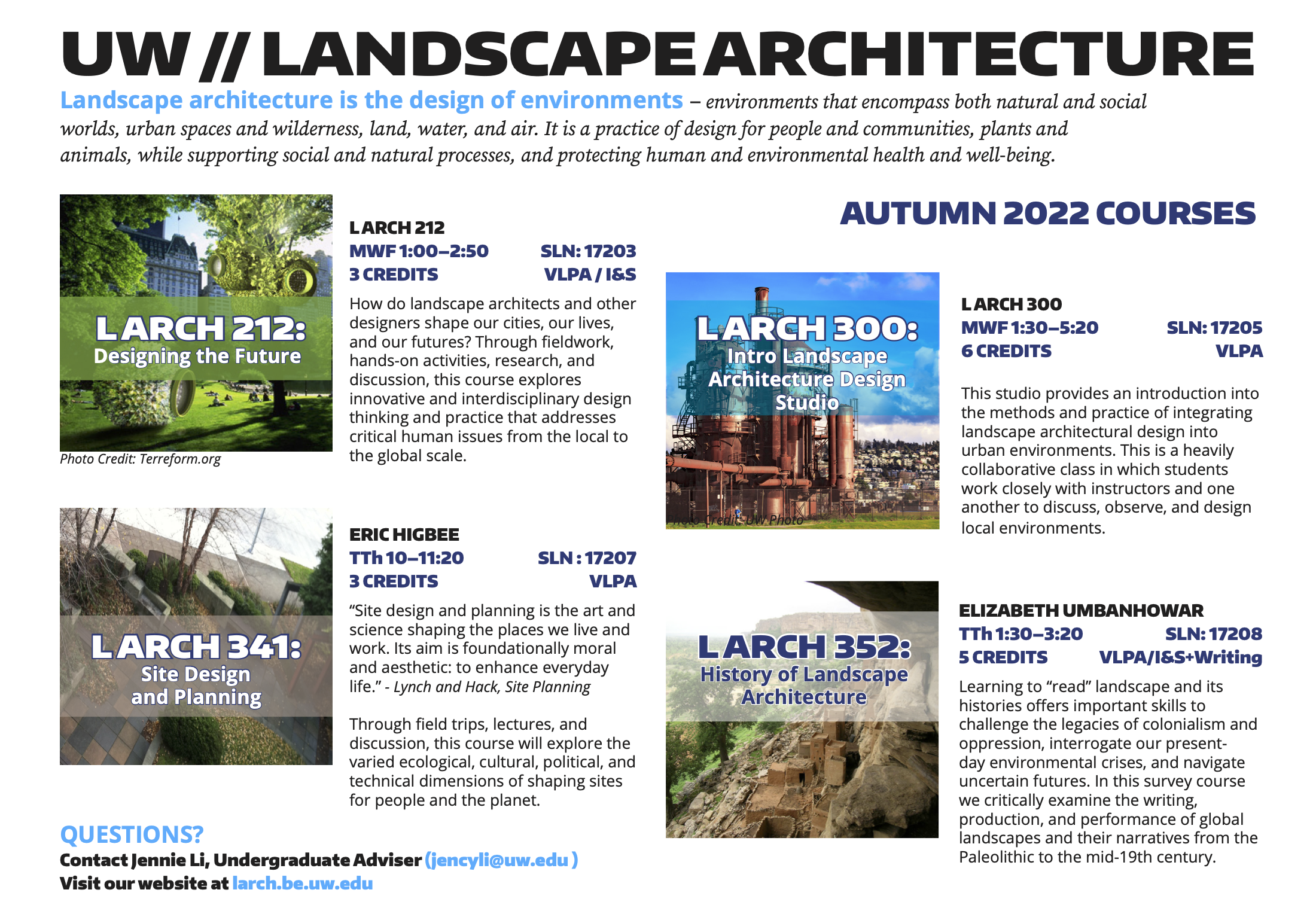
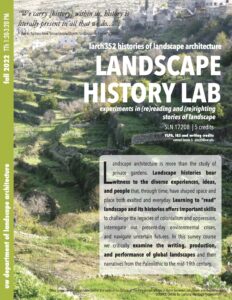 L ARCH 352 | Histories of Landscape Architecture
L ARCH 352 | Histories of Landscape Architecture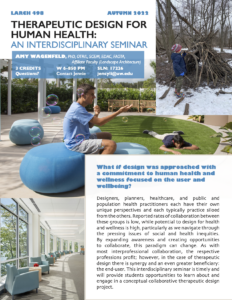 L ARCH 498A | Therapeutic Design for Human Health
L ARCH 498A | Therapeutic Design for Human Health